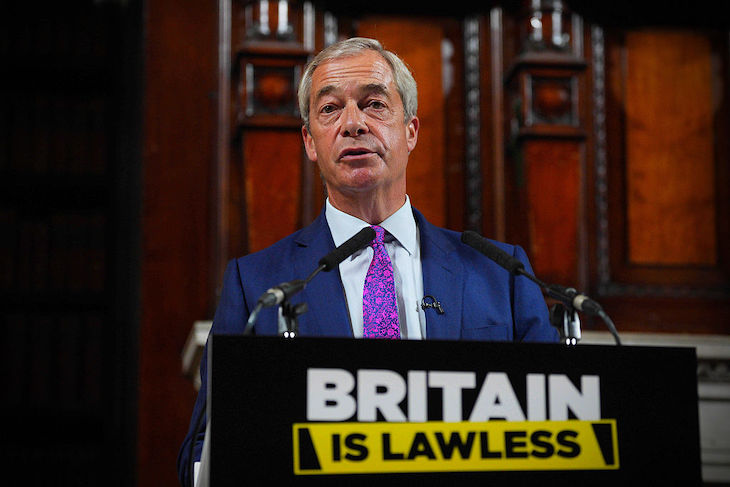It’s hard to disagree with Nigel Farage’s diagnosis that ‘Britain is lawless’. The Reform leader painted a bleak image of London in particular, as he unveiled his party’s crime crackdown in Westminster.
Farage’s message for criminals is that a Reform government would have ‘zero tolerance’
Farage spoke of a city where ‘moped gangs [are] running amok’ and shoplifting has soared. ‘We are facing nothing short of societal collapse,’ he said.
He’s right: even the Home Office has acknowledged there has been a ‘44 per cent rise in street crime, record levels of shop theft and a million incidents of antisocial behaviour’. But it’s debatable whether Reform’s proposed remedies for restoring law and order to Britain’s streets are the right ones.
Farage’s message for criminals is that a Reform government would have ‘zero tolerance’: every shoplifter would be prosecuted, every stolen mobile phone which can be tracked will be pursued, and intensive stop and search would be applied to ‘drive knives off the street’.
His goal is clear; he wants ‘criminals to slightly fear the police’. To achieve this, Reform plan to recruit 30,000 more police over five years, prioritising the hiring of military veterans and scrapping all DEI (Diversity, Equity, and Inclusion) roles and regulations. I sensed from Farage’s remarks that he would prefer a return to frontline policing primarily delivered by strong, tall men, who criminals will fear. Reform would also seek to make life easier for the police by establishing ‘pop-up custody centres’ allowing officers to get back on the beat faster.
And what happens when criminals are caught in Reform Britain? There will be fast-track courts, no bail for serious violence or sexual offences, and a concerted effort to hire more magistrates. Sexual offences, serious violence and knife possession would all carry automatic prison sentences with no chance of early release. A Reform government would also look at life imprisonment for people who commit more than three serious offences, recognising that ‘10 per cent of criminals commit 50 per cent of all the crime’.
All of this would, of course, require a huge expansion of our prison system. Reform intend to build ‘Nightingale prisons’ on Ministry of Defence land, creating 12,400 lower-security prison places. This may prove difficult, as I understand the MoD will be unwilling to give up ‘their’ property. The party would also seek to deport all 10,000 or so foreign nationals in our prisons, subject to reaching agreements with other countries. Farage insisted that he is close to agreeing a deal with Albania, and believes others would follow. Reform also hope to create thousands more ‘dynamic’ prison places overseas, where serious offenders will serve their sentences – including in countries such as El Salvador.
Finally, the party intends to ‘cut the cost of prison by 20 per cent’, pointing out that a cell in France costs around £40,000 per year, versus the £52,000 per year they cost in the UK.
Reform’s crime crackdown might generate good headlines but I am not convinced by this approach. Expanding the use of prison to the extent Reform is proposing would probably require another 20,000-30,000 spaces here, even if we do deport all foreign nationals, which may well prove hard as it relies on achieving international agreements. Relying on overseas prison cells to house those on longer sentences also seems ill-thought out. These programmes would likely be difficult and costly to set up, and seem to show a lack of interest in what happens inside prison. After all, even in Reform Britain, most prisoners would be released one day. This is why rehabilitation must be a crucial part of any crime crackdown.
Farage, to be fair, recognised this, saying that the aim of prison should be ‘to train, educate and rehabilitate’. But no meaningful rehabilitation can happen if someone serves their sentence in a foreign land.
So, while Reform has diagnosed much of what makes people feel scared and angry in modern Britain, its crime crackdown raises some questions.
Our society is increasingly lawless. But our prisons are too, and any serious policy needs to grapple with that. It’s not just about how long we lock people up, but what happens to them inside. The battle against crime has to be fought behind bars too, especially given the extent to which organised crime has penetrated our penal system. Hopefully, over the next six weeks, we will hear more from the party about this detail.






Comments